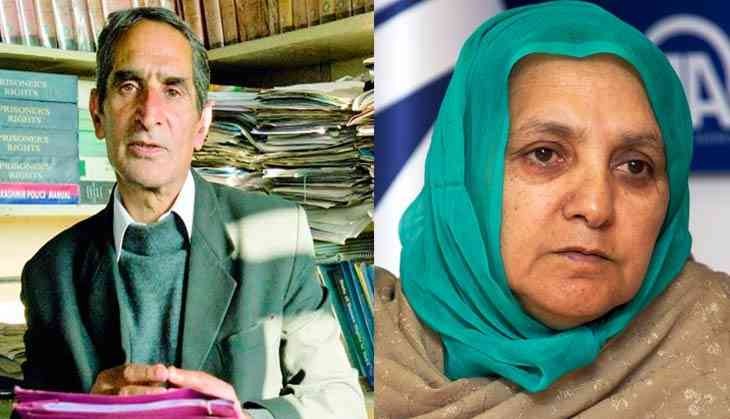Rafto Prize for two human rights activists from Kashmir: Here's what it means to them

Two long-time human rights defenders Parvez Imroz and Parveena Ahangar have been awarded the prestigious Professor Thorolf Rafto Memorial Prize, popularly known as the Rafto Prize, for human rights this year.
The past recipients of this award include Aung Sang Suu Kyi and Shirin Ebadi, both of whom went on to win the Nobel prize for peace.
In its statement, the Rafto Foundation for Human Rights said the award was given to the duo for their “decades of campaigning for human rights in the Indian state of Jammu and Kashmir”.
“Their long campaign to expose human rights violations, promote dialogue and seek peaceful solutions to the intractable conflict in Kashmir has inspired new generations across communities,” the foundation said.
Speaking about Parveena Ahangar, the foundation said that she “protests against enforced disappearances and challenges the perpetrators of violence”. Similarly, the foundation praised Imroz as “a lawyer and a leading intellectual who uses the law to ensure fundamental human rights and equality before the law in Kashmir”.
On his part, Imroz sees the award as an acknowledgement of the deteriorating human rights situation in Kashmir by the European civil society.
“At a time when the West has by and large written Kashmir off, this is a welcome development. It is an acknowledgement of the human rights situation in Kashmir and of the work of the people working to improve it,” Imroz told Catch.
“Besides, it also gives an opportunity to people like us to highlight Kashmir in Europe,” Imroz added.
Imroz said the situation in Kashmir needs some international visibility and an award like Rafto facilitates it.
“Otherwise whatever happens in Kashmir stays in Kashmir. We have been ignored by the world. The biggest challenge for the human rights activists in Kashmir is to gain the world’s attention. It is this attention that will set off a process which will bring Kashmir some global attention,” Imroz added.
Personally, Imroz said, the award was an encouragement and also ‘a kind of security” for operating in a fraught environment and said –
“Only thing that concerns Government of India is the international spotlight on Kashmir. So, the top awards for the human rights activists in Kashmir somehow makes the government accountable for its policies in the state.”
Imroz is also the convener of the International People's Tribunal on Human Rights and Justice in Indian-administered Kashmir alongside US-based academic Angana Chatterji and noted civil liberties activist Gautam Navlakha.
Ahanger, on the other hand, said the award will bring some attention to the people “subjected to enforced disappearances in Valley”.
“Around 7,000-8,000 people have gone missing in the Valley. The unending search of the families for their loved ones has been little noticed internationally,” Ahangar said.
“I hope awards like Rafto end this apathy,” Ahangar added.
Ahangar’s own son Javed Ahmad Ahanger, 16, disappeared on 18 August 1990. According to the reports, he was picked up by some security personnel on the day and was never seen again.
However, the tragedy of losing the son – who, according to Ahangar, had just passed his matriculation at the time of his disappearance – did not hold her back for long. Instead, the grief drove her out of the security of her home and into the rough and tumble of Kashmir’s fraught political environment.
She sought out all the parents whose sons had been subjected to enforced disappearance by various actors and agencies operating in the state. And in 1994, she formed the Kashmir’s own Association of the Parents of Disappeared Persons (APDP), a body fighting cases of those who went missing over the past three decades,
“I am not in this struggle for any political cause or for any self-aggrandisement. Our group is only after the information about those who have disappeared. Besides, my mission is one of sharing the pain. In the absence of a social and political support, there is a need for a group which works with and supports the families of the missing,” Ahangar told Catch.
Her work includes traveling to Kashmir’s distant corners to find out the families with disappeared members and then fight for justice for them.
“I have gone to remote villages, climbed steep hills to look for the distressed families,” Ahangar said.
Now APDP has more than 3,000 aggrieved families as its members. Her work has also caught the global attention. In 2005, Ahangar was one of the 1,000 nominees for the Nobel Peace Prize. She is also General Council member of The Asian Federation Against Involuntary Disappearances (AFAD).
Imroz has filed thousands of habeas corpus petitions on behalf of the families of the disappeared. In 2008, along with his team, he first discovered the mass graves in J&K. His group has exposed more than 7,000 mass graves in the region over the years, on which no action has yet been taken by the government.
Imroz has already received the Ludovic Trarieux International Human Rights prize in 2006 given by the Human Rights Institute of The Bar of Bordeaux, France, and the European Bar Human Rights Institute (IDHAE). The award has earlier been conferred to Nelson Mandela.
The duo will be traveling to Norway in November to receive the award and also get a chance to interact with the various civil society groups in the country.
“We will use this opportunity to create some more awareness about Kashmir. And tell the world that the overriding challenge in Kashmir is not terrorism but the massive humanitarian fallout of the thirty years of the conflict,” Imroz said.
Edited by Jhinuk Sen

